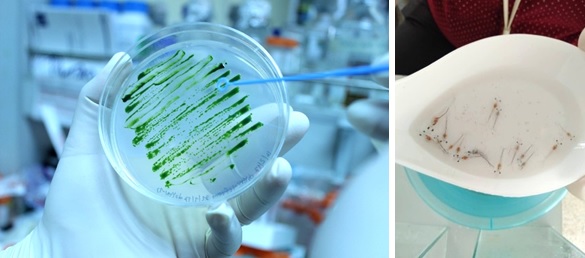Scientists from BIOTEC-NSTDA and the University of Kent embarked on a joint research to develop novel microalgal-based systems for shrimp disease control in Southeast Asia. The project is funded by the Royal Society through the International Collaboration Awards 2019. Led by Prof. Colin Robinson of the University of Kent and Thai collaborator Dr. Vanvimon Saksmerprome of BIOTEC Fish and Shrimp Molecular Biology and Biotechnology Research Team, this project will aid shrimp farmers in managing White Spot Syndrome Virus (WSSV) and Yellow Head Virus (YHV), two shrimp viral diseases prevalent in this region.

Shrimp farming is one of Thailand’s top export industries, reportedly producing 290,000 tons of shrimp/year, worth approximately 48 billion THB. The industry is vulnerable to disease outbreaks and can lose up to 60% of the production through diseases. Shrimp viral infection is the major threat, especially White Spot Syndrome Virus (WSSV) and Yellow Head Virus (YHV), not only in Thailand but throughout Southeast Asia.
In the proposed study, the green microalgae Chlamydomonas reinhardtii will be bioengineered to produce dsRNA, a promising strategy for combating shrimp viruses, targeting WSSV and YHV and introduced to shrimp through oral administration. A previous collaboration between Prof. Robinson and Dr. Samsmerprome successfully demonstrated that dsRNA produced in the chloroplast of Chlamydomonas reinhardtii provides a high level of protection against YHV. In addition, the project will investigate the effectiveness of microalgal extracts in protecting shrimp against multiple bacterial and viral pathogens when used in shrimp feedstocks. This part of the study will be performed by Dr. Apiradee Hongsthong of BIOTEC BioSciences and Systems Biology Research Team.

